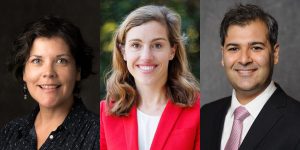The Alabama Water Institute launched its Faculty Fellowship Program in 2021 to recognize University of Alabama faculty members whose research, extension and education efforts have made significant contributions to advancing UA’s interdisciplinary water-related scientific communities.
AWI Faculty Fellows serve as representatives of AWI’s initiatives during their term and help promote the institute across UA, its partners and the public.
Each fellowship has a tenure of three academic years, which means the inaugural AWI Faculty Fellows have graduated the program. Dr. Leigh Terry, associate professor of civil, construction and environmental engineering, and Dr. Milad R. Esfahani, associate professor of chemical and biological engineering, both served as the first two Early Career AWI Faculty Fellows. Dr. Lisa Davis, associate professor of geography, was the first Distinguished AWI Faculty Fellow.
“One of my main motivations in becoming an AWI fellow was to work with the AWI and other water faculty to help focus and synergize water educational endeavors at UA,” said Davis. “Through new collaborations with faculty in the College of Engineering that evolved during my time as a fellow, I was able to be a part of the establishment of an NSF National Traineeship (NRT) Program focused on water, called Water R2O: Research to Operations.”
The Water-R2O NRT program has since welcomed its second cohort of graduate students. Davis said this now gives each NRT fellow a water-focused experience with a cohort of likeminded students from a variety of disciplines, such as biology, geography and engineering. She also collaborated with faculty in biological and geological sciences to propose a shared, interdisciplinary watershed science and management degree, which is currently in the review process.
“Nationally, there is increasing demand for water-specialized graduate training, and I am really proud of the headway we are making here at UA in providing new, water-focused training opportunities for graduate students that leverages the exceptional expertise of faculty coming for a wide variety of academic units on this campus,” Davis said.
For Terry, the program has propelled her research forward by providing essential support in many areas. This includes funding for instrumentation, publications, professional development and networking opportunities. She also credits the program with expanding her educational initiatives.
“With its backing, I introduced a course titled ‘Alabama-Columbia Water Sanitation and Hygiene,’ which builds on my Fulbright Award experience in Colombia and a grant received by the Capstone International Center from the Department of Education 100,000 Strong in the Americas Initiative,” Terry said. “Additionally, my graduate course, ‘Analytical Methods in Environmental Engineering,’ has benefited from access to analytical instruments in the shared water quality lab supported by AWI and the Center for Water Quality Research. AWI has also provided funding for graduate students to attend conferences and publish papers, thereby enhancing their scholarly activities and contributing to the broader academic community.”
Esfahani touted the benefits of being an AWI Faculty Fellow, not only in the classroom setting, but also for personal and professional development. Through AWI-led meetings with other faculty members, he and other colleagues were able to develop new joint proposals. These interactions broadened his research approach by incorporating diverse perspectives and expertise.
“My primary goal was to connect with faculty from different disciplines to cultivate more interdisciplinary research in the field of water,” he said. “Moving forward, I plan to continue my collaboration with AWI to promote cross-disciplinary, collaborative water research efforts and enhance strategic communications with campus and external stakeholders.”
During their time as fellows, Terry and Esfahani worked together to secure a grant from the U.S. Department of Interior Bureau of Reclamation to explore biological filtration and membrane technologies for optimized PFAS, or “forever chemicals,” removal from water.
Even though her time as a faculty fellow has come to a close, Terry said her goals of advancing the missions of the University, AWI, CWQR and her lab groups remain unchanged.
“Looking ahead, I plan to further contribute to AWI’s mission by continuing to collaborate with other researchers, reaching out to new partners, and maintaining a strong connection with the water research community and water utilities,” said Terry. “My focus will remain on fostering impactful research and educational initiatives that align with AWI’s goals.”

